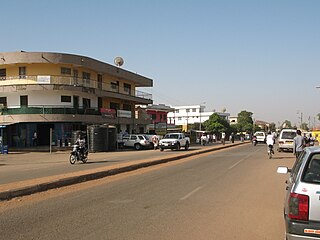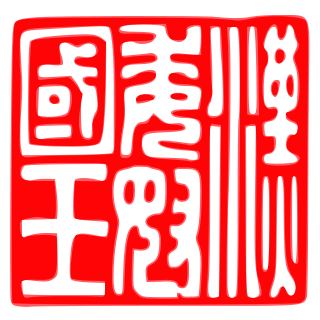Related Research Articles
Japanese is an agglutinative, synthetic, mora-timed language with simple phonotactics, a pure vowel system, phonemic vowel and consonant length, and a lexically significant pitch-accent. Word order is normally subject–object–verb with particles marking the grammatical function of words, and sentence structure is topic–comment. Its phrases are exclusively head-final and compound sentences are exclusively left-branching. Sentence-final particles are used to add emotional or emphatic impact, or make questions. Nouns have no grammatical number or gender, and there are no articles. Verbs are conjugated, primarily for tense and voice, but not person. Japanese adjectives are also conjugated. Japanese has a complex system of honorifics with verb forms and vocabulary to indicate the relative status of the speaker, the listener, and persons mentioned.
"Udzima wa ya Masiwa" is the national anthem of the Comoros. Adopted in 1978, it was written by Said Hachim Sidi Abderemane, who also composed the music with Kamildine Abdallah.
Witr is an Islamic prayer (salat) that is performed at night after Isha or before fajr. Witr has an odd number of raka'at prayed in pairs, with the final raka'ah prayed separately. Therefore, as little as one raka'ah can be prayed, and eleven at most. Most Hanafis pray 3 raka'ah with dua qunoot in the third raka'ah.

Na Wa is a district (amphoe) in Nakhon Phanom province, northeast Thailand.

Wa is a town and the capital of Wa Municipal District and the Upper West Region of northern Ghana. Wa had a 2012 settlement population of 102,446. Features of the town include several churches and mosques, the Wa-Na Palace, the St. Andrew's Catholic cathedral, the University for Development Studies (UDS), a museum, a nearby hippopotamus sanctuary in Wicheau, the mushroom rock In Jirapa and the ants hill at Nanvielle. The geography of Wa is notable for the dramatic monadnock Ombo Mountain, which is located around Kaleo and visible from much of the Wa town. Other notable towns around Wa region include Naaha and Ga.
Japanese particles, joshi (助詞) or tenioha (てにをは), are suffixes or short words in Japanese grammar that immediately follow the modified noun, verb, adjective, or sentence. Their grammatical range can indicate various meanings and functions, such as speaker affect and assertiveness.

The Kalina, also known as the Caribs or mainland Caribs and by several other names, are an Indigenous people native to the northern coastal areas of South America. Today, the Kalina live largely in villages on the rivers and coasts of Venezuela, Guyana, Suriname, French Guiana, and Brazil. They speak a Cariban language known as Carib. They may be related to the Island Caribs of the Caribbean, though their languages are unrelated.
Kwaza is an endangered Amazonian language spoken by the Kwaza people of Brazil. Kwaza is an unclassified language. It has grammatical similarities with neighboring Aikanã and Kanoê, but it's not yet clear if that is due to a genealogical relationship or to contact.
The Wala or Waala live in Upper West Region of Ghana. They are a predominantly Muslim people who are the founders of the city of Wa and the Kingdom of Wala. They speak the Wali language, which belongs to the Gur group. There are 84,800 speakers of the language as of 2013. Their neighbors are the Birifor, Dagaaba, and Vagla peoples.

Nakoku was a state which was located in and around modern-day Fukuoka City, on the Japanese island of Kyūshū, from the 1st to early 3rd centuries. Much of what is known about it comes from ancient records of both China and Japan.
Guatay is an unincorporated community in the Cuyamaca Mountains, in the Mountain Empire area of southeastern San Diego County, California.
"Nikutai wa Shōjiki na Eros" is the fourteenth single by Japanese girl group Melon Kinenbi. It was released on February 9, 2005, and its highest position on the Oricon weekly chart was #21. This was the last of Melon Kinenbi's singles to be produced by Tsunku, before fellow Sharam Q member Taisei took over.
Mamaindê, also known as Northern Nambikwara, is a Nambikwaran language spoken in the Mato Grosso state of Brazil, in the very north of the indigenous reserve, Terra Indígena Vale do Guaporé, between the Pardo and Cabixi Rivers. In the southern part of the reserve, speakers of Sabanê and Southern Nambikwara are found.

The King of Na gold seal is a solid gold seal discovered in the year 1784 on Shikanoshima Island in Fukuoka Prefecture, Japan. The seal is designated as a National Treasure of Japan. The seal is believed to have been cast in China and bestowed by Emperor Guangwu of Han upon a diplomatic official (envoy) visiting from Japan in the year 57 AD. The five Chinese characters appearing on the seal identify it as the seal of the King of Na state of Wa (Japan), vassal state of the Han Dynasty. The seal is currently in the collection of the Fukuoka City Museum in Fukuoka, Japan. The seal is very well known in Japan, as its taught in Japanese history books to be a cultural asset which ascertains how Japan as a nation came into being. Its the first known textual record of Japan as a country.
Jirel is a Southern Tibetic language of Nepal. It is spoken in Jiri, in Tshetrapa village, Jungu village, and Cheppu village of Dolakha District and Sindhupalchok and different parts of Nepal.

"Kimi no Na wa Kibō" is the fifth single by Japanese girl group Nogizaka46. It was number one on the Oricon weekly singles chart. It reached number three on the Billboard Japan Hot 100. On December 31, 2015, Nogizaka46 appeared on the 66th NHK Kōhaku Uta Gassen for the first time and sang this song.
The 1968–69 Algerian Cup was the 6th edition of the Algerian Cup. ES Sétif were the defending champions, having beaten NA Hussein Dey 3–2 in the previous season's final.
The 1973–74 Algerian Cup was the 12th edition of the Algerian Cup. MC Alger were the defending champions, having beaten USM Alger 4–2 in the previous season's final.
Taman is an extinct Sino-Tibetan language that was spoken in Htamanthi village in Homalin Township, Sagaing Region, northern Myanmar. It was documented in a list of 75 words in Brown (1911). Keisuke Huziwara (2016) discovered an elderly rememberer of Taman in Htamanthi who could remember some Taman phrases as well as a short song, but was not fluent in the Taman language. However, no fluent speakers of Taman remained in the area.